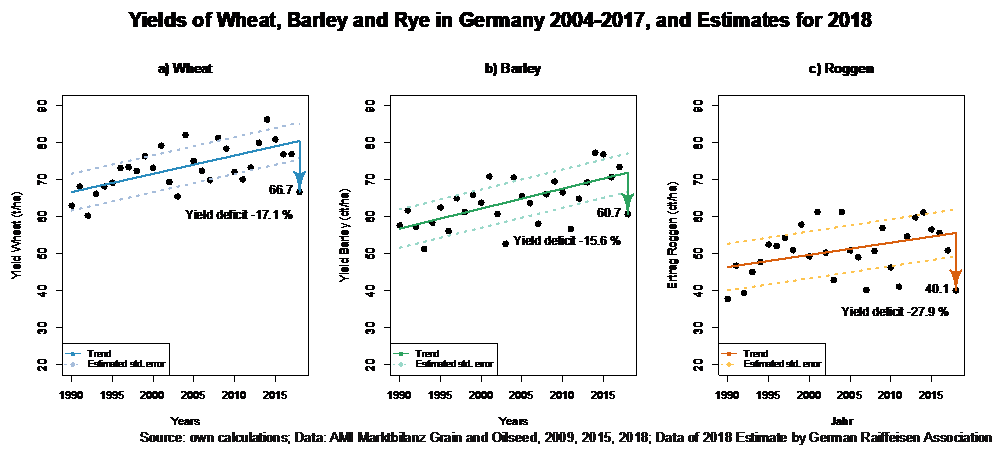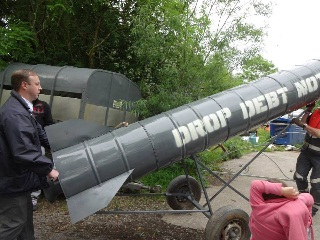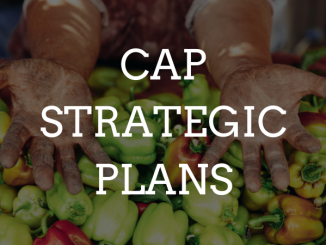
The German summer 2018 will be remembered for a long time as one of the hottest and driest. A long lasting high pressure brought high temperature records combined with extremely low rainfalls. The average temperature was 3.3 degrees higher than the long-term average (1961-1990), the national average precipitation in July was at 40 l/m², which was a mere 52% of the long-term average (see Deutscher Wetterdienst). Especially in Northern Germany the months of June, July and August had significantly lower rainfall that is typical.
Besides the danger of wildfires, lack of precipitation is bad for farming. In arable farming, estimations of lower yields have been made since the end of June, when grain harvesting started. The following figure gives and overview on the latest yield-estimate of the German Raiffeisen Association (one of the greatest agricultural traders) from the beginning of August, which clearly documents the extent of this bad harvest.
The heatwave has hit the agricultural sectors in different ways: Arable farms have lower yields, but in some cases higher protein content and prices per tonne, in a context of reasonable prices in recent years.
Livestock farmers (dairy and meat) are suffering from a fodder shortage. Milk farms with grazing systems had to use part of their winter fodder already. For indoor (stable) systems, the situation wasn’t much better. Milk farms suffered from a sharp price decline since 2014 caused by declining exports, the Russia embargo and the runout of the milk-quota. Here profits and also net investments went down and are still substantially lower than in arable farming. Any discussion about state aids has to account for this economic background.
Regionally, Northern Germany was more affected than the South: Schleswig-Holstein with lower yields of -31%, followed by Brandenburg (-27%), Saxony-Anhalt (-26%), Mecklenburg-Vorpommern (-25%) and Lower Saxony (-20%) (see BMEL).
Can state aids be justified?
In July the farmers’ association (Deutscher Bauernverband) demanded a billion in state aid (See Reuters). It was far from clear how this sum was calculated, especially with ongoing updates by DBV itself.
The Criticism from environmental NGOs and the press was sfwift, as they have heard these refrains before.
(“Die Sonne brennt, der Regen fällt, der Bauer ruft nach Steuergeld!”)
“Whether it’s sunshine or rain, the farmers always ask for tax payers money” as the mock rhyme chimed.
Other famers associations like the organic farmers, environmental NGOs and agricultural economists asked if this was a normal or exceptional occurrence: should society take the costs of this yield loss, or is the drought is just a normal event, to be included by farmers in their risk calculations?
Even within the German farmers’ association, some regional units (as in Northeastern Lower Saxony, a region where irrigation is quite common in agriculture) criticized headquarters with their general request for state money. Bauer Willy, a famous German farm blogger, also raised a number of concerns and criticized his colleagues for a missing risk strategy (Das ist erst der Anfang). Martin Häusling, MEP for the Green Party, stressed that livestock farms may be hit much harder than arable farms, and suggested a solidarity payment for this sector (see his press release from 22.08.2018).
There are a number of general points about the debate:
- Farmers are impacted by this outstanding drought, but other sectors in the economy are too. Farming in itself is not an argument to grant extra, dedicated support – there should be more to it.
- The Common Agricultural Policy (CAP) still provides its largest part as income support via the direct payments without analyzing whether farming households are “in need”. Other incomes or assets within the household are normally ignored by the EU Commission, with “hectares eligible to direct payments” as the only criteria. This is hard to understand for the general public. Therefore, it should be crystal clear, that any state aids should be linked to whether a farm or a household is really “in need”.
- If climate change is a substantial problem for farming, then in medium term, the priorities should be set to develop a better strategy for both mitigation and adaptation of climate change.
Minister Klöckner Holds Firm
The new minister of agriculture, Julia Klöckner (CDU) reacted with reluctance to the farmer plea. She stated that yield deficits were of course substantial; however, any reasonable reaction of her ministry could only evolve from the final yield reports. Her party, the Cristian Democratic Union, is traditionally at the side of the farmers’ association. Therefore, from a political point of view, her reaction was surprising for many political observers. On August 22, estimation from most federal states were there and then she finally declared this year’s drought as a “national adverse weather event” (see BMEL).
She announced state aids for farmers amounting to 370 Mio. EUR, co-funded by the federal states. The support is structured as follows:
- Support will be granted only to farmers, who’s yield is lower than 30% in comparison to an average of the previous years. (This is the typical criterion of the EU’s agricultural guideline for state aids based on adverse weather events.)
- Given this lower yield, support will be granted to farms whose existence is threatened.
- Only 50% of the damages will be remunerated by state aids. (The two last criteria are stricter than the EU’s agricultural guideline, which allows a remuneration up to 80% of the damages).
Some of the details are not clear yet, especially how to assess whether the existence of a farm is threatened. Furthermore, farmers can postpone tax-payments and payments for social insurance.
Also, the federal ministry in Berlin and the Bundesländer agreed that farmers could use Ecological Focus Area (EFA) such as catch crops and fallow land to harvest some fodder.
Conclusion: Mrs. Klöckner has proven some political talent
Politically, Julia Klöckner seemed to have found a good compromise. The general point, that state aid should reach only farmers in need, was taken up and damages are only partly remunerated, which sends the right signal to the farming sector to develop farm specific strategies to prevent risks. On the other hand, the figures show that the losses are substantial and especially for the livestock sector, many farms already carry the load of decreased milk prices.
Related to this, the number of slaughtered cows has gone up in July and August beyond the normal average and the price for beef has been decreased. This shows, that we can already observe secondary damages, so Julia Klöckner now has a number of solid arguments to grant support.
Can we observe a greening and biodiversity rollback?
There remain a number of questions beyond todays support payments: Arc 2020 for good reason asked what ecological impact the use of ecological focus area might have (Climate Extremes Cause CAP Greening Rollback).
I would suggest it depends on the measure. While it is of course not optimal for biodiversity, cutting grass and herbs from areas of catch crops and fallow land might be the least bad option. Many experts do not expect a huge biodiversity effect from EFA catch crops (see Ecological Focus Area (EFA) in Germany: good for biodiversity & the tax payer?). Only fallow land (15% of the German EFA) has a stronger effect and here, the main biodiversity effects will probably take place from April to July. However, even this type is often located on marginal land and not in the center of arable land, where it’s biodiversity effect would be much larger. And as ARC2020 point out, EFAs perform weakly so the damage (relative to the starting position) is limited.
A more pertinent questions may be: will biocides be allowed in EFAs next Spring? This could be more harmful for biodiversity. Drought should not be used as an argument to establish practices, which counteract the main purpose of EFA. Furthermore, farmers should be required to re-establish those elements next year, so that effects can be maintained over the years.
What is the long-run climate strategy of national and European agricultural policy?
Climate change is here for the foreseeable future. The announced payments will only solve this year’s financial problems of the farms, who’s existence is endangered. But the payments do not replace a medium-term strategy for climate change. Mrs. Klöckner, the EU Commission and others should develop ideas on how to cope with risks.
Some agricultural economists already started the debate on climate adoption: Robert Finger (from ETH Zürich), has recently re-published a text, where he argues in favor of a weather index risk insurance – a product the insurance industry still has to develop, but first estimates are promising. Oliver Mußhoff (University of Göttingen) and Nobert Hirschauer (University of Halle) argue, that policy should create a tax-free risk-fund, where farmers can pay in and use it later, if harvests are extremely bad. However, both also note, that a simple tax-free reserve for farmers (without any condition) would not be appropriate, since it would just help profitable farms to save tax-payments without any like to extreme weather or bad harvests.
It might also be a good point in time, to think about climate change mitigation in agriculture: Can agriculture be a part of the carbon trading system or do we need other related solutions? Transaction costs of the trading system might give arguments in favor of a sector specific solution. Can we borrow elements of organic farming to make conventional farming more resilient, does breeding provide new drought tolerant breeds? How do we support the utilization of wet grassland, which are carbon-sinks? So far, agri-environmental and climate programs (AECP) are not sufficiently directed to this grassland type, which can play a central role for mitigation.
Overall, there are still many more medium-terms problems and challenges to solve, which are more complex than the simple questions, do we provide state aids for farmers or not.







1 Trackback / Pingback
Comments are closed.